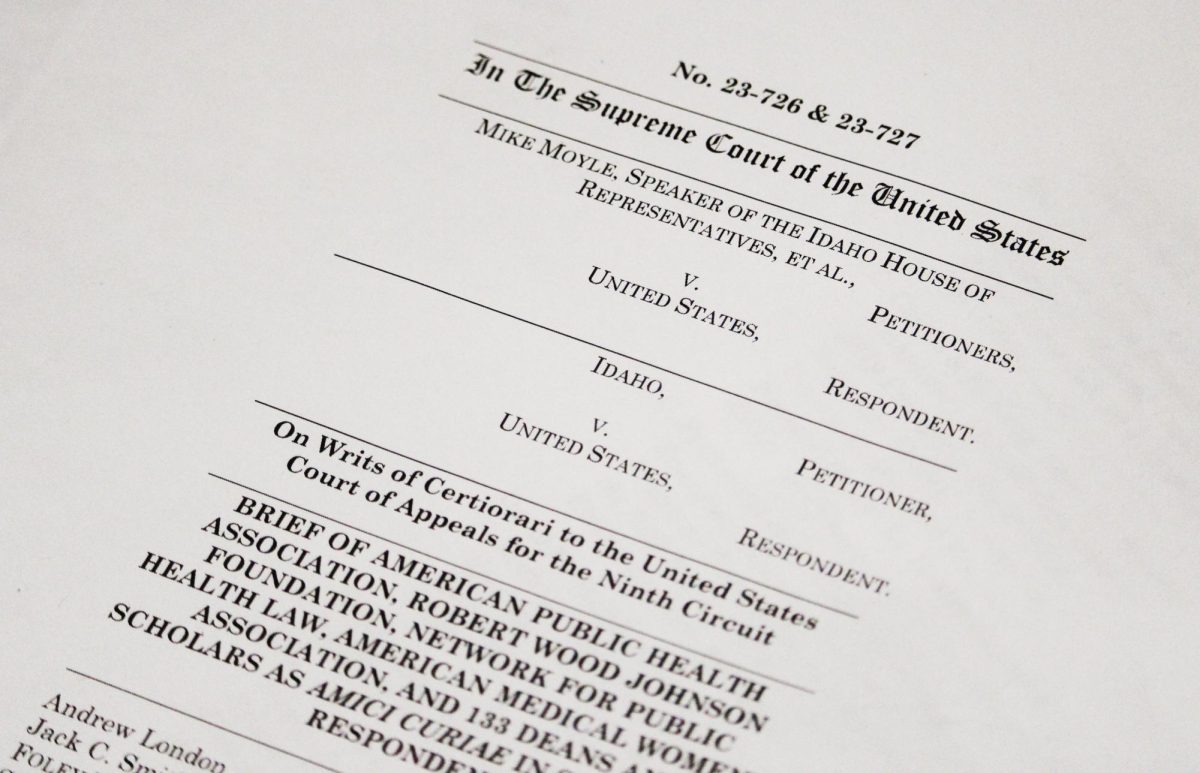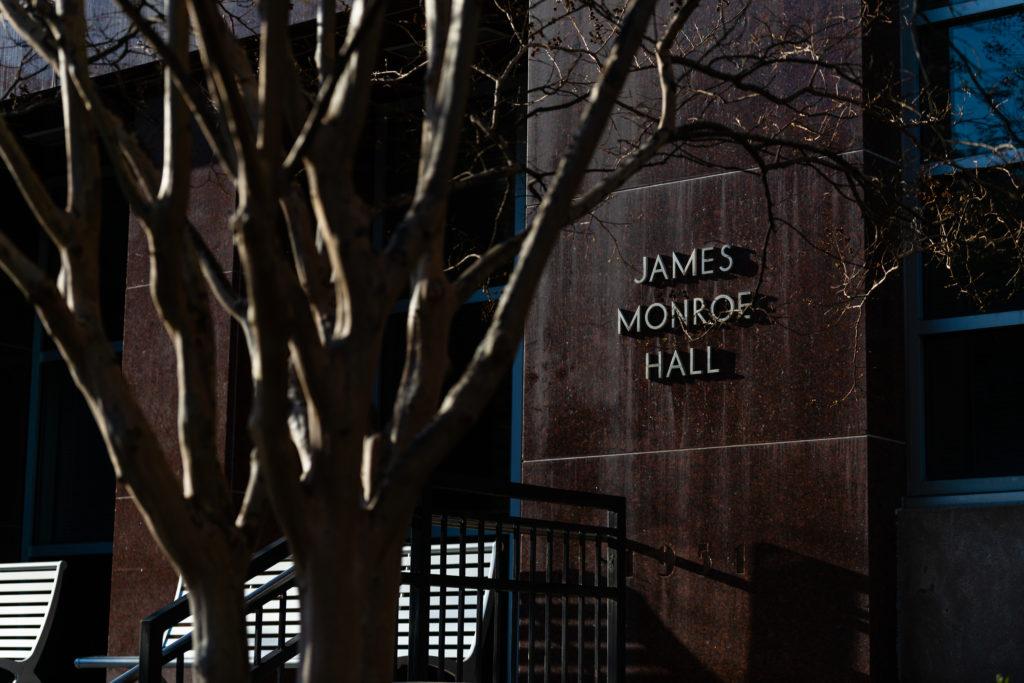2022 was a year of evolution mixed with tension for GW – as new administrators arrived, University decisions, free speech disputes and abortion rights advocacy stirred debate on campus and across the country.
GW started the year with a new president in office as Mark Wrighton took the helm of the University’s top post in an interim capacity and navigated through moments of controversy, fielding criticism over a project that tracked students’ movement without their knowledge, and campus history, marked by the retirement of the Colonials moniker. Instances of faculty discrimination against students in the classroom, a Supreme Court justice’s departure from a GW Law seminar and an attempt to oust the Student Association president from office spanned the rest of major headlines this year.
Here’s a look at the top stories at GW from 2022:
Students face acts of discrimination in the classroom
[gwh_image id=”1157158″ credit=”Photo Illustration by Grace Hromin | Senior Photo Editor” align=”none” size=”embedded-img”] Thousands signed a petition calling on officials to fire a professor who a student said incorrectly claimed she couldn’t have a service dog in class in February.[/gwh_image]
Students spoke out against acts of racism and ableism in the classroom this year through petitions and protests, prompting reviews of faculty positions and sparking calls for officials to address a history of discrimination and prejudice on campus through a diversity review of GW.
During the first week of spring in-person instruction in January, GWTeach Professor Alicia Bitler used the N-word in an Anti-Racist STEM Education course when it appeared in a painting she was presenting to the class. Bitler stepped down from her position teaching the class following the incident, and officials declined in February to say whether the University would take disciplinary action against her.
Bitler’s name is no longer listed on the GWTeach faculty page.
Days later, more than 4,000 people called on officials to fire School of Business Professor Marie Matta after she denied a student access to her service dog in class. Officials declined to say in February whether the they would take disciplinary action against Matta.
Matta is set to teach three sections of the course in the spring 2023 semester, according to GWeb.
GW replaced a human rights professor Michael Stoil in late September after he defended racist comments that he told his students he made to a provost during a phone call. Stoil later said he would leave his position at GW at the end of the fall semester.
This fall, Black Student Union leaders and students called on officials and student leaders to take further action to combat racist incidents involving faculty members against Black students.
Administration grapples with criticism, historic change under Wrighton
[gwh_image id=”1158841″ credit=”File Photo by Kyle Anderson | Photographer” size=”embedded-img” align=”none”]As interim University President Mark Wrighton wraps up his first calendar year in his up-to-18-month tenure in the University’s top spot, officials have begun to narrow the list of candidates for his replacement.[/gwh_image]
After the tumultuous tenure of former University President Thomas LeBlanc abruptly ended with his retirement announcement in September, Wrighton began his interim term in January, working with officials to reposition the University’s struggling medical enterprise, build GW’s financial aid resources, restructure IT and recruit new officials to the University.
Little more than a month into the job, Wrighton was quickly met with multiple moments of controversy for administrative decisions that generated criticism from the GW community.
In early February, Wrighton expressed concern about posters on campus criticizing the Chinese government’s handling of COVID restrictions and its human rights abuses against Uyghur people, ultimately deciding to remove them. But as the incident attracted national attention, Wrighton called his reaction a mistake and vocalized his support of members of the GW community advocating against “all forms of discrimination, marginalization and oppression.”
Within a week later, Wrighton told the University community in an email that an IT program had tracked students, faculty and staff members’ movement across campus in fall 2021 without their knowledge. Wrighton said the program ended that December, and he learned of the project shortly after taking office in January.
The Board of Trustees voted to abandon the nearly century-old Colonials moniker in June following a two-year review of the name launched in response to years of pressure from student leaders and organizations to discontinue the moniker because of its correlation with colonialism, slavery and racial discrimination. Officials expect to choose a replacement for the Colonials moniker by the 2023-24 academic year.
COVID policies soften as year progresses
[gwh_image id=”1155331″ credit=”Grace Hromin | Senior Photo Editor” size=”embedded-img” align=”none”]GW’s COVID policies have softened since students returned to campus in January, a pattern that has mirrored the District’s transition away from daily COVID updates and required indoor masking.[/gwh_image]
The University’s COVID policies continued to loosen throughout the year, leaving behind mandates and requirements that have been enforced since 2020.
GW’s indoor mask mandate wavered in April when officials lifted the rule across campus with the exception of University health care facilities before reverting back to the pandemic-era requirement a week later following a sharp uptick in the campus positivity rate. Officials later removed the mask mandate in most campus settings in September but continued to require masking in some spaces like classrooms, health care facilities and GW-owned transportation.
The University ended its asymptomatic testing requirement in July after requiring community members to take biweekly tests during the last academic year.
In August, officials discontinued COVID isolation housing for campus residents who tested positive for the virus after lodging infected students in extra residential space, including the Yours Truly hotel, earlier during the pandemic. As students returned to campus in the fall, campus residents with roommates infected with COVID turned to hotel reservations, spare couches and mattresses in friends’ rooms to avoid additional exposure to the virus.
Roe v. Wade reversal sparks student outcry
[gwh_image id=”1166519″ credit=”Danielle Towers | Assistant Photo Editor” size=”embedded-img” align=”none”]Students and local residents piled in front of the Supreme Court to protest the monumental decision to remove federal abortion protections in June.[/gwh_image]
After the Supreme Court’s majority draft opinion to overturn Roe v. Wade was leaked in May, threatening the removal of federal abortion protections and calling reproductive rights across the country into question, student organizations mobilized abortion rights advocacy efforts through letter-writing, phone-banking, social media activism and canvassing campaigns. Questions arose in the District concerning what the future of abortion access and protections would look like in a city that lacks statehood or self-governance authority.
An online petition calling on GW Law to remove Supreme Court Associate Justice Clarence Thomas from his position lecturing a Constitutional Law Seminar in the wake of his vote to overturn Roe v. Wade garnered more than 11,000 signatures in late June. Officials rejected the demands for his removal, citing the University’s role in debate as an “essential” part of GW’s mission.
But in an email sent to students registered for the seminar in late July, Thomas’ co-lecturer announced that Thomas would not teach the course in the fall semester.
Student Association leaders struggle over executive power
[gwh_image id=”1168970″ credit=”Rachel Schwartz | Assistant Photo Editor” size=”embedded-img” align=”none”]The Student Association’s former executive chief of staff filed a complaint against SA President Christian Zidouemba in Student Court, contesting the legitimacy of his presidency in August.[/gwh_image]
After former Student Association Vice President Kate Carpenter – widely presumed to be in the running for the presidency – stepped out of the race for the SA’s highest position, citing incidents of cyberbullying, a record-low turnout of students elected then-senior Christian Zidouemba out of a field of three candidates to lead GW’s student government. For the vice presidency, junior Yan Xu won the position by a razor-thin margin of nine votes.
Zidouemba’s victory marked the final outcome he had been chasing through three consecutive bids for the position, but his leadership was thrown into controversy in July when the SA’s executive cabinet unanimously voted to remove him, deeming him unfit to carry out his duties as president. A day later, SA leaders announced Zidouemba would retain his position after Xu and Communications Director Aiza Saeed withdrew their votes for removal.
At least seven members of the SA’s executive branch resigned following Xu and Saeed’s statement, including Chief of Staff Cordelia Scales and Legislator General Dylan Basescu.
Thurston Hall reopens as dining revamp stalls
[gwh_image id=”1173567″ credit=”Chuckie Copeland | Photographer” size=”embedded-img” align=”none”]Officials plan to open a new dining hall in the Shenkman Hall basement this spring, which will follow Thurston Hall’s dining facility as part of their revamped dining system.[/gwh_image]
Foggy Bottom’s real estate landscape changed in 2022, with the reopening of Thurston Hall as GW’s most modern residence hall to date and the closure of District House to Foggy Bottom residents as a revamped dining system readied to launch.
Over the summer, officials delayed the debut of GW’s Foggy Bottom-based series of all-you-can-eat dining halls as part of the University’s new unlimited dining system, pushing their openings back from the start of the fall semester because of supply chain issues. In the same announcement, officials said they scrubbed plans to upgrade District House as a dining hall, instead pivoting to a new slate of GWorld vendors operated by food service company Chartwells to replace restaurants like Chick-fil-A and Kin’s Sushi.
Thurston Hall – which had been under renovations since 2020 – reopened as a freshman residence hall, with modern amenities like wider elevators, increased common spaces, a central courtyard and a dining hall that opened in October.











